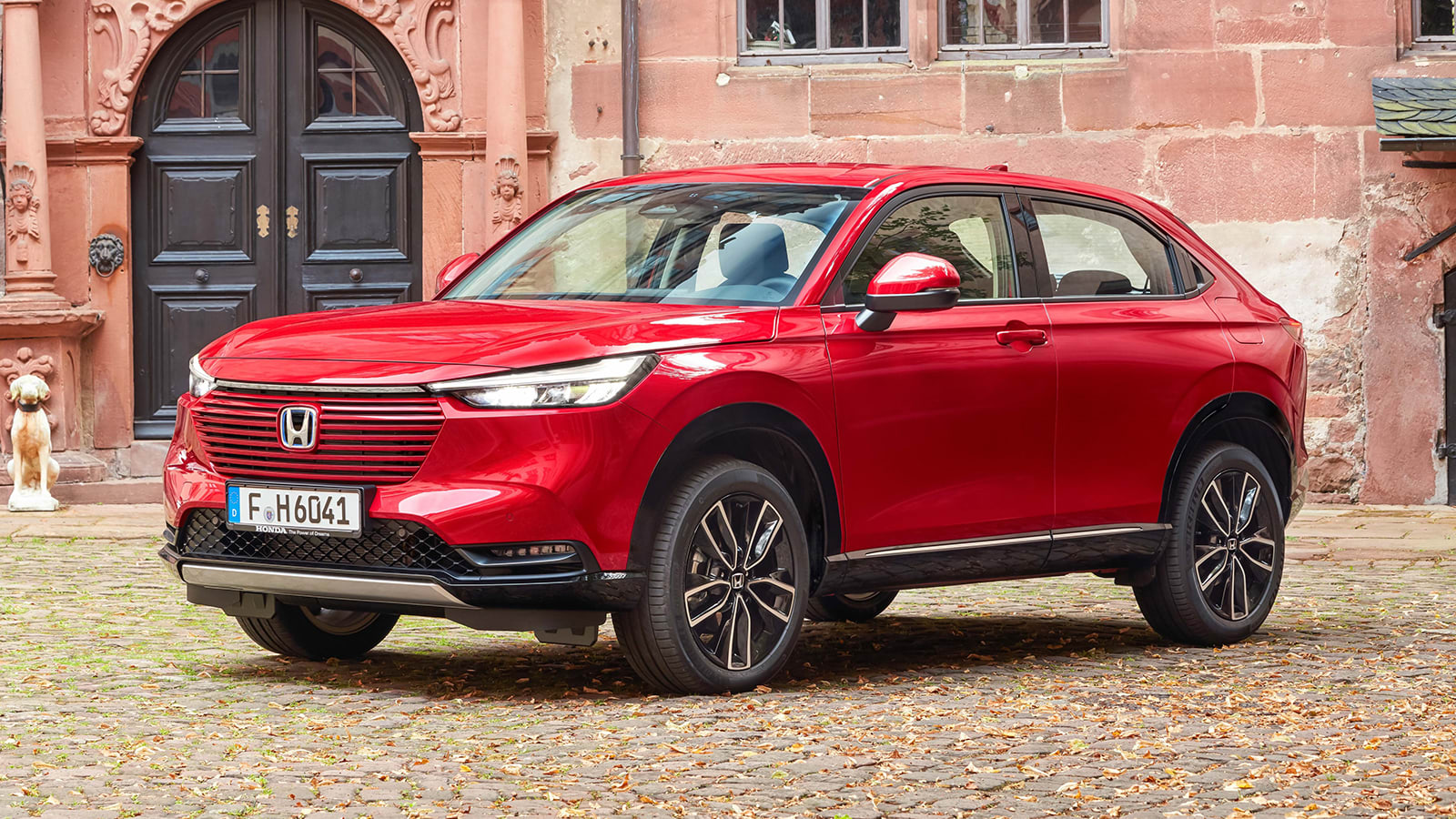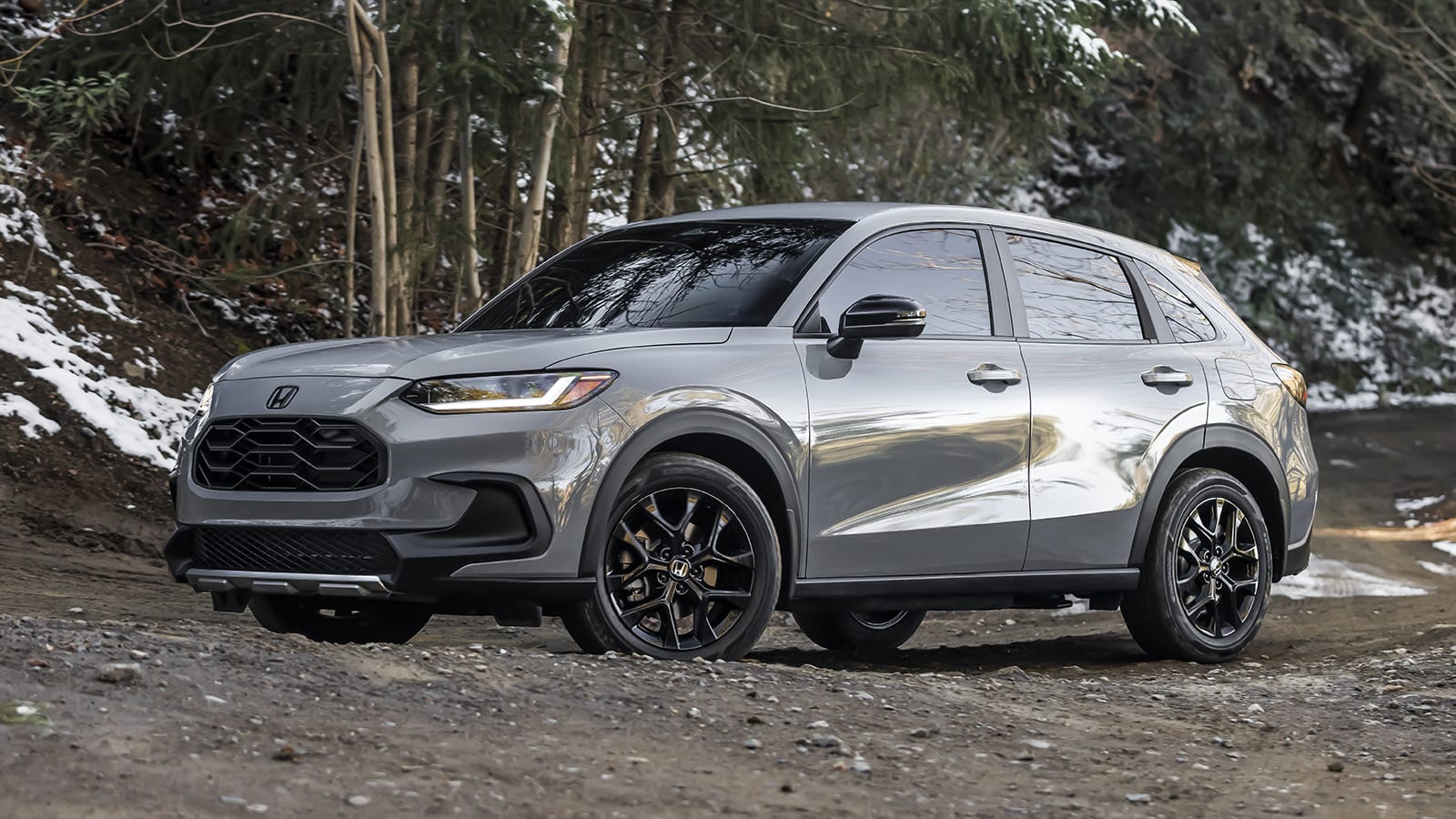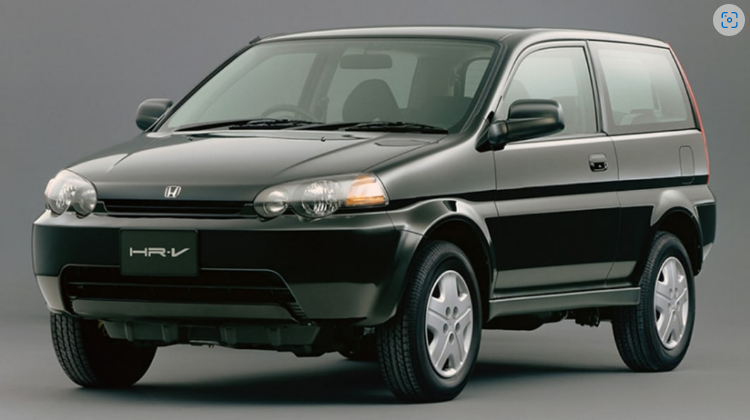This year, the United States will get the second-generation Honda HR-V. But only here and in China do they call it HR-V. The HR-V, which is also sold in Japan, is on its third generation in Europe. But in Japan, it’s called the Vezel, just like its predecessor, which was called the HR-V in the U.S. and Europe. Confused? We’re not mad at you. Strange things have happened to this small crossover SUV. So we thought we’d explain it to you. We have to go back to 1998 and look at the original for context.
First Generation
The Honda HR-V went on sale in Japan in 1998, Europe in 1999, and throughout the rest of 2006 in the United States. And for the first year, you could only get it with two doors. “Hi-rider Revolutionary Vehicle” was the name of the vehicle, which sat just below the similarly named CR-V (which stood for “Comfortable Runabout Vehicle”). The CR-V was based on the Civic, and the HR-V was based on the smaller Logo hatchback for the Japanese market. The length, width, and height of that two-door model were 157.3 inches, 66.7 inches, and 62.6 inches, respectively. The four-door model, which was released in Japan and other countries in 1999, was just under 4 inches longer. When compared to the modern CR-V, the HR-V was up to 20 inches shorter. The “Hi-rider” part of the equation is that the ground clearance was 7.5 inches, which was just half an inch less than the CR-V.

MORE ARTICLES
Stellantis will stop giving Canadians the COVID-19 vaccine on June 25.
See pictures of the 2023 Honda HR-V
Solera’s Audatex Market Value Manager now includes EBay Motors’ live used car data.
When it originally came out, the HR-V had only one engine option—a 4-cylinder naturally aspirated with VTEC and another that didn’t. Power and torque ratings for the VTEC engine were higher than those for its non-VTEC counterparts (123 ponies and 106.5 pounds-feet, respectively). A five-speed manual and a continuously variable gearbox (CVT) were also offered. The VTEC engine only had one gearbox option: the 6-speed manual. It came standard with front-wheel drive and had an all-wheel drive option available from Honda. With either a five-link torsion beam or an independent rear suspension, MacPherson struts were used up front and five-link torsion beams at the back.
Generation X and Y
After the first generation, the HR-V was out of production for a long time. The situation in Japan, on the other hand, remains suspended. Since Japan’s original HR-V was actually dubbed the Vezel in Europe, this is the reason. The term “vehicle” and the jewelry term “bezel” were supposedly combined to come up with the name. However, we will continue to refer to it as the HR-V for convenience’s sake. As a result of this, it lost its neat two-door configuration but gained interesting Fit features. It received a “Magic Seat,” which could either fold the backs of the seats or rise the bottoms of the seats to allow for more cargo space. A low cargo floor was made possible by putting the petrol tank under the front seats of the vehicle.
Initially launched in Japan at the end of 2013, this HR-V is now available in Europe and the United States. There was a wide range of powertrains. It was available in Japan with either a hybrid or non-hybrid gas engine and a dual-clutch manual or continuously variable transmission. Both a manual and a continuously variable transmission (CVT) are available for the diesel engine that was distributed to Europe. A 180-horsepower manual variant of the turbocharged model became available in Europe later on. A 141-horsepower, naturally aspirated, 1.8-liter four-cylinder was the only engine available in the United States. There used to be a six-speed manual transmission option, but that was eventually phased out in favor of a continuously variable transmission (CVT). When it was released, the suspension design was the same as the previous generation’s.
In China, the HR-V is also known as the X-RV. Like its European and Japanese competitors, it had a wide range of powertrain options. In addition, Honda’s local partners sold a variety of electric versions under various brand names.

This generation is the third generation.
HR-lineage V’s gets increasingly complicated with each new generation. European and Japanese models are based on the Fit, with the Vezel in Japan being the name of the Japanese model. It no longer has a turbocharged model in favor of hybrid power. A 129-horsepower hybrid model is exclusively available in Europe, but Japan gets a 1.5-liter four-cylinder variant that produces 116 horsepower. The only transmission option is a CVT, but both front- and all-wheel drive are available. Euro HR-V and Vezel retain the Magic Seat, too, just as the most recent Fit and the latest Fit Sport. e:NS1 and e:NP1 will be marketed in China as a fully electric model as well. Above, you can see it.

The HR-V is a completely different vehicle here in the United States than it is in Europe. It has grown by 9.4 inches in length and 2.6 inches in width. This car now shares its foundations with Honda’s small sedan/hatchback: it’s a blend of Civic and CR-V dimensions. A more complex suspension system, including MacPherson struts up front and a multi-link independent rear suspension, is also part of the platform shift. It also gets the Civic’s naturally aspirated 2.0-liter four-cylinder, which produces 158 horsepower and 138 pound-feet of torque. All-wheel drive and front-wheel drive are both available with the CVT, the only available transmission. The Magic Seat is gone, but it gains a convenient fold-flat back seat in its place. HR-V models have a long history of being referred to by a variety of different names around the world, and this new model is no exception.












 Bitcoin
Bitcoin  Ethereum
Ethereum  XRP
XRP  Tether
Tether  Solana
Solana  Dogecoin
Dogecoin  USDC
USDC  Cardano
Cardano  Lido Staked Ether
Lido Staked Ether  TRON
TRON  Chainlink
Chainlink  Avalanche
Avalanche  Sui
Sui  Wrapped stETH
Wrapped stETH  Wrapped Bitcoin
Wrapped Bitcoin  Stellar
Stellar  Toncoin
Toncoin  Hedera
Hedera  Shiba Inu
Shiba Inu  Polkadot
Polkadot  WETH
WETH  LEO Token
LEO Token  Bitcoin Cash
Bitcoin Cash  Litecoin
Litecoin  Hyperliquid
Hyperliquid  Official Trump
Official Trump  Bitget Token
Bitget Token  Uniswap
Uniswap  Pepe
Pepe  Wrapped eETH
Wrapped eETH  USDS
USDS  NEAR Protocol
NEAR Protocol  Ethena USDe
Ethena USDe  Aave
Aave  Aptos
Aptos  Internet Computer
Internet Computer  Ondo
Ondo  WhiteBIT Coin
WhiteBIT Coin  Monero
Monero  Ethereum Classic
Ethereum Classic  Cronos
Cronos  POL (ex-MATIC)
POL (ex-MATIC)  Mantle
Mantle  Render
Render  Dai
Dai  Bittensor
Bittensor  Algorand
Algorand  Artificial Superintelligence Alliance
Artificial Superintelligence Alliance 
Leave a Reply